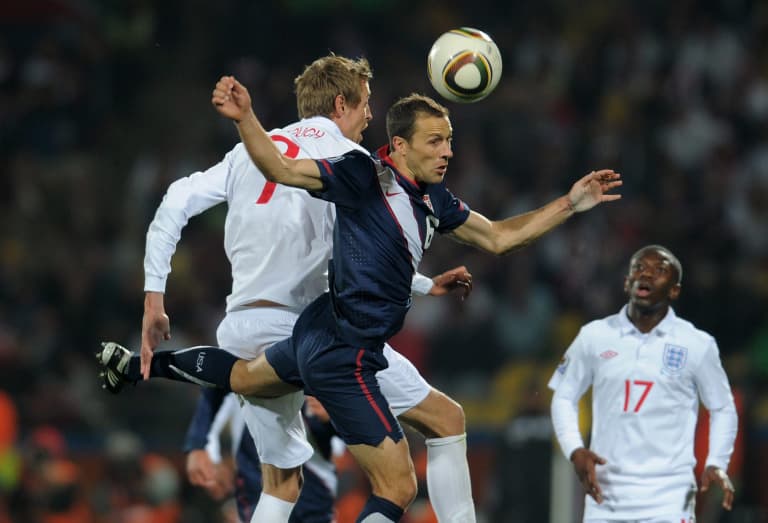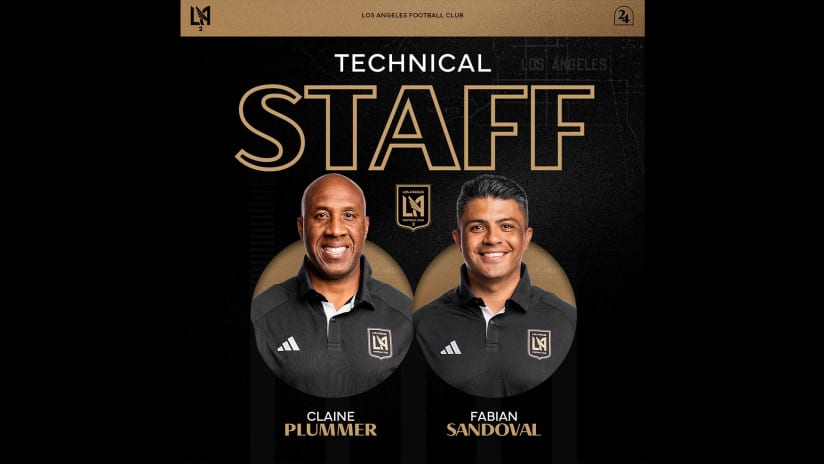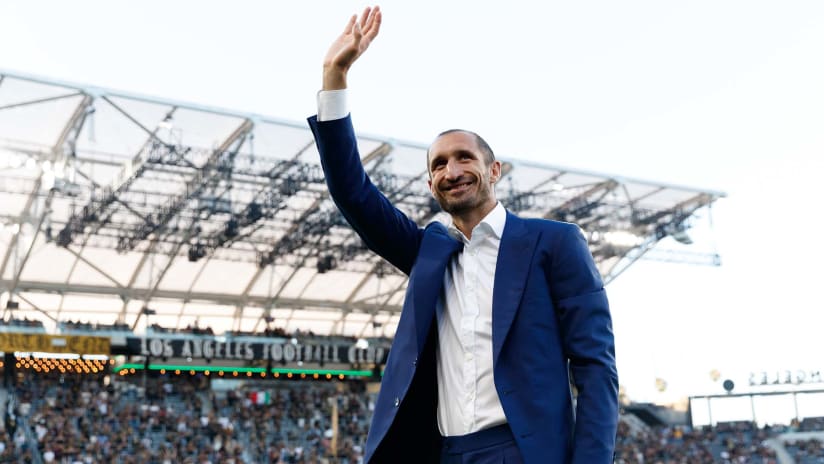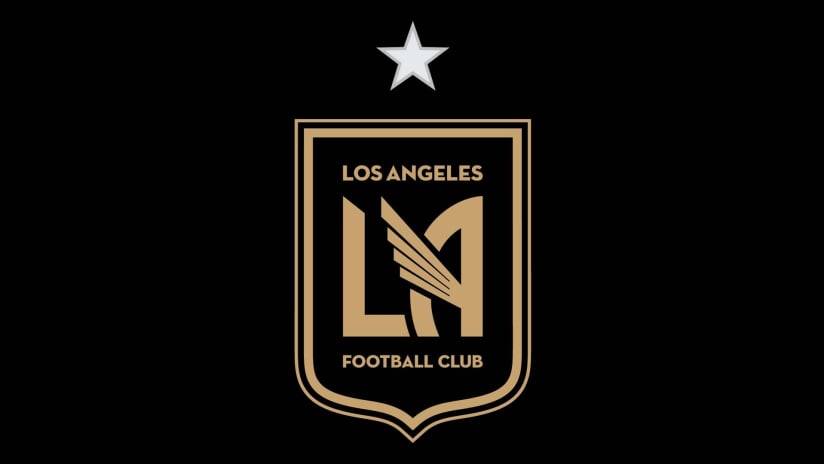LAFC head coach Steve Cherundolo played 86 times for the United States Men’s National Team, and is one of only 11 U.S. players to appear on three World Cup rosters. Cherundolo was on the 2002, 2006 and 2010 roster – and played every minute for the U.S. in the 2010 tournament that saw them win their Group and advance to the knock-out stage. Cherundolo is considered one of the top players ever to wear the red, white and blue, and was enshrined in the U.S. Soccer Hall of Fame in 2021.
During his successful time with the national team, Cherundolo left an impact on his teammates that is still felt to this day. Former U.S. National Team standouts like Taylor Twellman, Stuart Holden, Mo Edu and Heath Pierce could all tell that the scrappy right back had the makings of a head coach many years before.
LAFC lead broadcaster Max Bretos was able to catch up with some of Cherundolo’s former national teammates – and the respect they have for the “Mayor of Hannover” is something to behold.
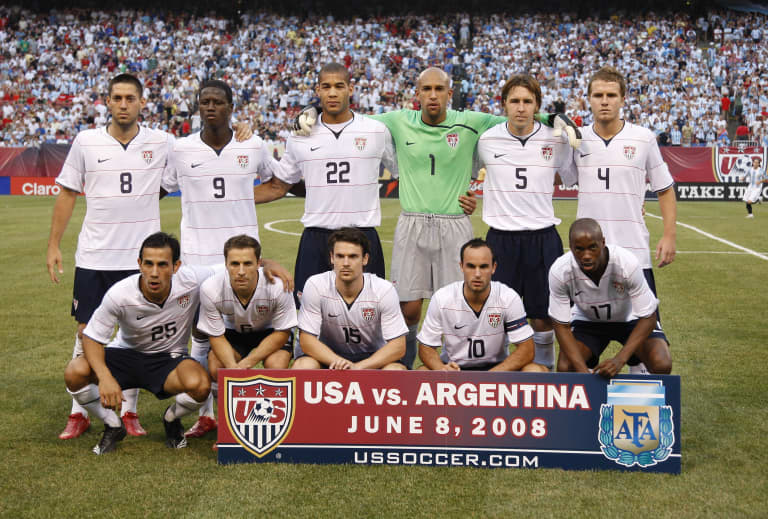
TAYLOR TWELLMAN
U.S. National Team: 2002-2008
New England Revolution: 2002-2010, scored 101 goals in 174 career MLS appearances
ESPN Announcer
TWELLMAN: What is remarkable about what Steve Cherundolo accomplished in Germany was that it wasn’t in 2018, 2019, 2020 when the American players really exploded on the world scene. He did it in 1999 when so many of us were viewed as second rate citizens in the game. The guy’s nickname is ‘Mayor of Hannover.’ He did it starting in 1999 when the American player really struggled to make a name for himself. He did it his way, which I think there is a ton of respect for doing that at one club. Three World Cups and all the accomplishments with the national team, but I think it is understating what Steve Cherundolo has accomplished in Europe. LAFC fans are really going to appreciate that experience. The LAFC players will as well because they know how trustworthy, how reliable and more importantly what an important experience it was to develop himself and I think he is going to see that in some of the young players.
MAX BRETOS: We talk about so many players now coming from the United States to Europe and a lot in Germany. Is it safe to say that was made easier because of what Steve was able to do? How he was changing the perception of the American player?
TT: When people look at where the American player has grown to. Especially Pulisic and McKennie, Adams, Reyna and all those players that really use Germany to get a foot in for their professional career. I think when it is all said and done, it’s not going be now, but a lot of people have to point to what Steve Cherundolo did. I don’t think people fully understand where the American player was in 1998, how abysmal that World Cup was from the American perspective. How the American player was viewed. There were a lot of us that were young. They were all trying to make it in Germany after a World Cup where many people looked at us and said, ‘They are not going to be able to cut it.’ So, what Steve Cherundolo did is prove to people that not only can you do it, but you can do it at a high level. You can do it at a level where then you have your own testimonial [match]. A lot of us are going to point to that the evolution of the American player was helped by Steve Cherundolo’s success at Hannover.
MB: I know you are a big fan of tactics and we’ve seen the emergence of the German game seep into the top clubs and the top leagues. And the German game has now been very forward thinking and at times on the front foot with how they play the game. How do you think that experience is going to help Steve, who has been in those systems in Germany at several clubs over the last few years.
TT: I think when Steve told some of us that he was going to get into coaching, it didn’t really surprise us. Where the influence is going to come into play is with the philosophy and style of play. It’s not a secret. Steve would probably argue with me right now that German is his first language and English is his second language. I say that tongue and check because I think Germany is going to have a real influence on Steve and who he is, his identity his philosophy. We’ve seen it at Chelsea, Liverpool and we’re now seeing it at Manchester United. There is just a real onset of German influence in trying to build the identities and characters of clubs. In saying that, you have to tip your cap to what Bob Bradley did and set the foundation for this club. A lot of that had a little German influence, too. It is not going to be a drastic change. But the influence that Steve had in his career is going to play a huge part in what he is and who he is as a coach.
MB: We know being successful as a coach in Major League Soccer can be a bit of a crap shoot. What tells you that Steve is going to be well conditioned to be successful here with LAFC?
TT: The hardest thing about adjusting to Major League Soccer is the ups and downs within a season - And Steve is a player and one of those guys that has an even keel. He stayed through the middle and was one you can count on. I look at LAFC in 2021 and how difficult of a season that was for the coaching staff and players with injuries, and yet they still had one of the better seasons in the league by the numbers. They were a little unlucky. Steve Cherundolo is set up with that personality. He also doesn’t have 20 years of coaching experience, so there is of course going to be growing pains. Not only for LAFC under Steve, but Steve as a person, and throughout his career he has dealt with those kinds of things at the upmost professional level. He has done it with a smile on his face. I think players are going be surprised how happy they are going to be going to work and wanting to improve and play for LAFC. When the roster and new players show up, I think it’s going to be an exciting time to be an LAFC fan.
MB: From a personal level, what kind of guy is he and how does that translate into being a successful coach?
TT: Steve is one of the more genuine, authentic people you will ever meet. And he is also one of more competitive guys I have ever met. There’s a reason why he is named ‘Mayor of Hannover.’ While everyone talks about it - he’s a nice guy, he’s genuine, he’s real…but he will do everything and anything he can to win that moment and that game. There’s going to be a real balance from Steve within the group, and with the media. Behind closed doors, LAFC is going to try and win and slit your throat every single moment they can. They will probably do it with a smile on their face because their head coach has it. He’s one of the more nasty guys I have ever met and played with. That is why we all love him.
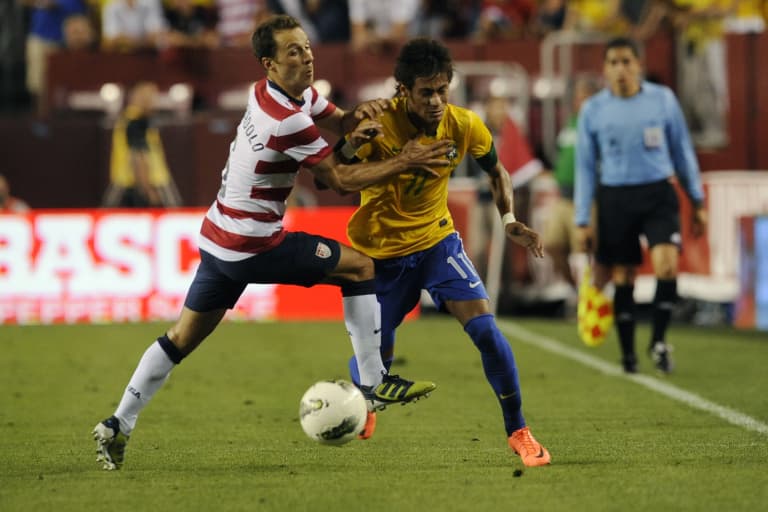
MAURICE EDU
U.S. National Team: 2007 – 2014
10-year career in MLS: Toronto FC, Philadelphia Union; and Scotland: Rangers (96 appearances, 3 Scottish championships)
FOX Sports Commentator
MAX BRETOS: Most American players dream going of over and playing in Europe and having that experience. You were fortunate to fulfill one of those dreams, playing in Scotland for Rangers. Not many had it quite like Steve Cherundolo though in his career -- so when you know what the challenges are and what it takes to survive playing in Europe and you look at what he has been able to do for two decades, what thoughts come to mind about what he was able to accomplish?
MAURICE EDU: When I think about Steve, his career is incredible. He went to Germany at a young age. I think he was 19 when he made his debut for Hannover. It’s so unique, his career, because even when you look at the players I played with during that little era and you look at the players nowadays, to stay at one club is such a unique thing. To stay at one club in some ways speaks very highly of the player he was because that showed that the club valued him. He became the ‘Mayor of Hannover’ and captain of the team. I remember coming into the national team and I knew of Steve beforehand but getting the chance to play alongside him and follow his career very closely, it’s just an incredible 15 plus years that he had at one club. And there’s a reason why he’s a Hall of Famer of the U.S. National Team. There’s a reason he had the success he had as a player and there’s a reason why players to this day look up to him and are inspired to have a career like his.
MB: Why is that so important in the development of a player, to be able to experience that, and how influential is it for young players to have someone with those resources under their belt? If you were a young player, how would you react knowing you are going to be under the tutelage of someone who had those accomplishments that Steve did?
ME: If I was a young player, I would be a sponge. I was that way to a certain extent when I was a young player. I had certain veteran guys, whether they were teammates, whether it was a coach who had experience and something I was striving to accomplish. So, for these young players who have aspirations to play in Europe, to play in Germany specifically, there’s no better resource then to tap into him. Ask questions. Ask how he was able to have such a prolonged career in a league that is very competitive. You see some of the young U.S player who are in Germany now, well, the pathway and credibility that these players have now was in part paved for by a guy like Steve. Because when you talk about being able to play at a club for as many years as he did, that shows a level of consistency, a level of trust, and he built that up over the course of his career to open doors for some of these young players to go over there. So, if I am a young player and I have access to someone like him, I am just picking his brain. I am going to annoy him, that’s what I’ll do. I would annoy him to the point of exhaustion because I think it’s so valuable and I think sometimes players are naïve and they do not take full advantage when they have access to players like that or coaches like that. It’s a great resource for a lot of these young players from not just his playing career but also having gone on post career to tap into the coaching world as well.
MB: How difficult is that for a former player like him to get into that coaching world, because we know those licenses are hard to obtain. We’ve heard these stories on how grueling it can be – so can you give us an idea about the challenges about going through that process in Europe to get those UEFA licenses?
ME: Well, I never pursued my license. But I would say is that it shows that Steve had this in his mind. Nowadays you see players are more active in trying to pursue that because they recognize that there is going be a day where they cannot kick a ball around anymore. Steve was aware of that early on. He took full advantage and made sure to put himself into the right positions to obtain that license and then that opens the door for you to have that post career. To explore the things you dreamed of doing after your playing career. Whether that is coaching or whatever that looks like. For him it was coaching, and he knew it was important to get that pro license. He immersed himself into an environment that would allow him to be successful. And then when he had the license it allowed him to take that next step which was being an assistant coach, coaching youth teams in Germany as well and opening the door to now come here to MLS and be the head coach of the one of the biggest clubs in MLS.
MB: Did you get that impression as a teammate of his and particularly having played with him during the World Cup in 2010 that this was something he could pursue and be good at as a coach?
ME: There are certain players you look at and go ‘Yeah, he’s got that.’ And I am not sure if this is something he thought of initially when he was playing because when you’re a player you have tunnel vision and you’re so focused on that next game, that next training. I will say that one thing that stuck with me when I first came into the national team was that Steve had a good way of communicating. Sometimes you have to be a little more demanding and challenge young players. I was a young player when he was a veteran on the national team. He had a good way of finding that balance of being able to challenge me, to demand more from me but then also recognizing when he needed to pull me aside to have a one on one conversation. That was a little more from the side of compassion and just being able to level and recognize that this is a young player and he is going through some growing pains and let me point this out to him, let me show him that he should do x,y, and z. That was something that struck me. I always knew that he was a guy that I can go to and ask questions because he made himself very open and approachable, which I think are key traits when you’re going to become a professional manager and you are managing big personalities. You are also trying to bring through young players and make sure they feel comfortable in an environment where you have superstars so those are traits that stood out to me initially that now that he is a coach, I’m like ‘Ok, I can see how that is going to pan out well for him.’
MB: When you think of having the combination of having that European expertise but also being from Southern California, being an American kid and being successful in the MLS, we know you need to have a good balance. Do you see him approaching this so that he can hit the ground running?
ME: Well, I think he’s done the right thing. He made sure that he was at a club for such a long time. He knew that was going to put his foot in the door. He took the right steps. He was an assistant coach at Stuttgart and Hannover. Coached the youth teams in Germany as well. And then recognizing that MLS was a market he wanted to pursue his coaching career in. He came over a year early and immersed himself in the LAFC family and understands the situation a little better. He also understands what the culture is of the club so that way he can come in and hit the ground running. He’s had a chance to work with some of these young players with the Vegas team when these players would come on loan from LAFC. I think all those traits lend themselves well to make him be prepared. Will things be perfect? Of course, there is going be growing pains. It is his first role as a head coach. There is a reason why LAFC feel they can trust him. They feel comfortable with the level that he is going to bring, that he is able to demand and achieve what this club wants to achieve. I think he’s done all the right things to put himself in this position and be prepared for day one.
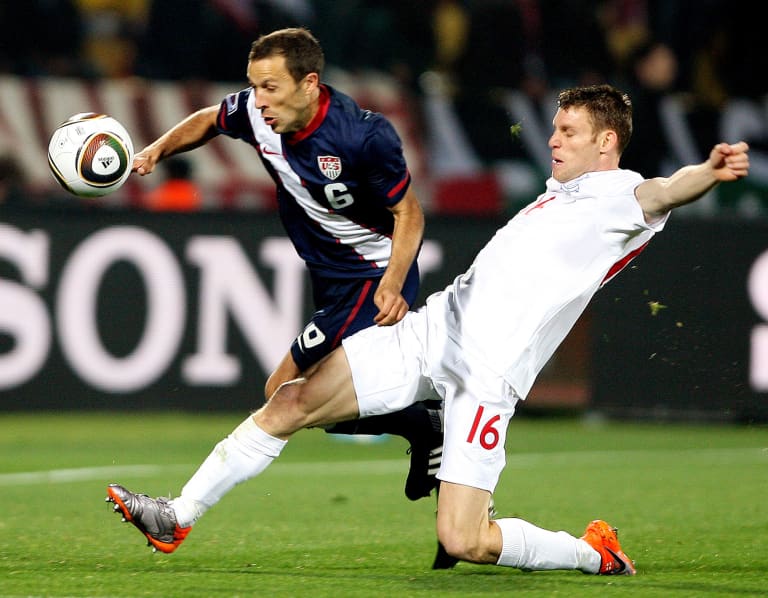
STUART HOLDEN
U.S. National Team: 2008 – 2013
Houston Dynamo: 2006-2009 (88 appearances, 15 goals)
Bolton Wanderers: 2010-2014
FOX Sports Commentator
STUART HOLDEN: Steve is a guy that broke the early mold of going to Europe at a very early age. He was scouted with the U-20 national team and now has been a full-blown German for the last 20 years! This is a guy who worked his way up the lower leagues in Germany when he signed with Hannover. They were in the second division and he went with them to the first division. He was one of the first Americans to captain a team in the Bundesliga. I hate saying he was an underrated player because clearly he is rated by his teammates and every coach that has coached him and by U.S. soccer fans and influential people because he was just recently inducted into the U.S Soccer Hall of Fame. He was a stalwart at right back, and reads the game so incredibly well. He could play multiple positions, but as a right back he was one of the best right backs we’ve ever had at U.S. Soccer. He was ‘Mr. Dependable,’ a great teammate, a guy you would want to go to battle with and a guy who was so good, there were many games you wouldn’t notice all the good stuff he was doing. In many ways, that was the best compliment you can give him because he complemented his team so incredibly well.
MAX BRETOS: I have noticed there is a lot of love for Steve. What makes him a guy that people would want to go to battle with him, want to play alongside him and play for him?
SH: I say about Steve as a teammate, he was a guy you would look to for advice. He was a guy I would always seek out and talk to because he had such a level head. He had such a great understanding of the game. He also has such great experience. As a player when I was coming up in the U.S Men’s National Team I always talked to him about different moments in my emotions. He always had a good way of keeping me motivated yet keeping me grounded at the same time. Saying ‘Hey you need to earn this and do all the right things to be able to put yourself in the best possible position.’ I think that comes down to the coaching he’s been a part of -- giving him a different perspective of the American game and the game over in Europe with Germany. He was also that guy that liked to laugh and joke and have a good time, but as soon as you crossed that white line on to the field he was a guy you didn’t want to be across from, because he would quite happily kick you, chop you down and do anything to win at all costs. I think that is what made him the ultimate teammate. You can trust him, you can talk to him - but also you want to avoid him because you knew he was going to kick the crap out of some other guy on the other team and do all the dirty work that you needed to do to be able to shine and do all the good stuff.
MB: Stu, you know as well as anybody that being a successful coach in Major League Soccer requires a unique skillset. When you look at what Steve has done, how do you look at the balance he brings, having that first-rate experience in Germany and bringing it to Major League soccer. How do you look at what he has all together that will make him a successful coach?
SH: I think Steve is a student of the game. When you look at former teammates and guys that you’ve played with, guys that you’re even in the locker room with as you’re playing, you can pick out guys and say ‘Hey I think that guy is going to go into coaching. He will make a great coach.’ You see that they understand the game. You see that they are always studying tape and studying the way the game is played. They are listening to coaches and asking questions. Steve was that guy. He was also a guy that toward the end of his career that you would see coaches go to, talk to and ask for their opinions and that’s because they trusted and valued his opinions. When I look at Steve and see what he’s done, his career ended a little earlier than what he would have liked. I knew that he actually wanted to come back in Major League Soccer as a player but then with the last knee injury, he ended up going straight into coaching in Germany. Hearing the reviews from people over there and also hearing his experiences personally to me about coaching the Hannover youth teams, about coaching the Hannover first team, and then Stuttgart and then the German youth federation as well. This is a guy who has seen it all and done the different types of badges that you need to do - having his UEFA pro license and ultimately this last year with the Las Vegas Lights, which was one of his biggest learning experiences of being with young players and helping them develop them and pushing them for the first team, which now he is going to have the opportunity to help coach LAFC. I know this is a guy who is going to put every ounce of effort and everything he can do into this and pour his heart and soul into the Black & Gold. I truly believe he will be a success.
MB: You mentioned that he put his arm around you and gave you advice. Do you have a specific example of Steve’s on-field coaching that applies to you or something that you saw?
SH: I remember vividly. I was playing as a right winger for the U.S. National Team. Steve Cherundolo is my right back which was always a nice feeling because you turn around and know you had a guy that was back there that was going to clean up the mess if I gave the ball away or had a mistake. I remember we were playing Poland in Chicago in a friendly and I was playing on the right wing playing against the left back that was quick and was playing aggressively against me and I couldn’t find space. Every time I checked back to get the ball from Steve this guy was right behind me and I wasn’t open. Steve said next time I have the ball, run toward me and as soon as the guy comes with you, spin behind and I am going to dump the ball into the channel because that’s where the space will be. Sure enough, I run back a couple yards and this guy comes with and I just darted the other way and Steve clips a ball behind and it ended up being a free one-on-one for me to cross the ball in. It was just a great example of a guy who knows the game within the game. These are the types of players as a coach that you want on the field because he is coaching for you in those types of moments. I learned a lot from that.
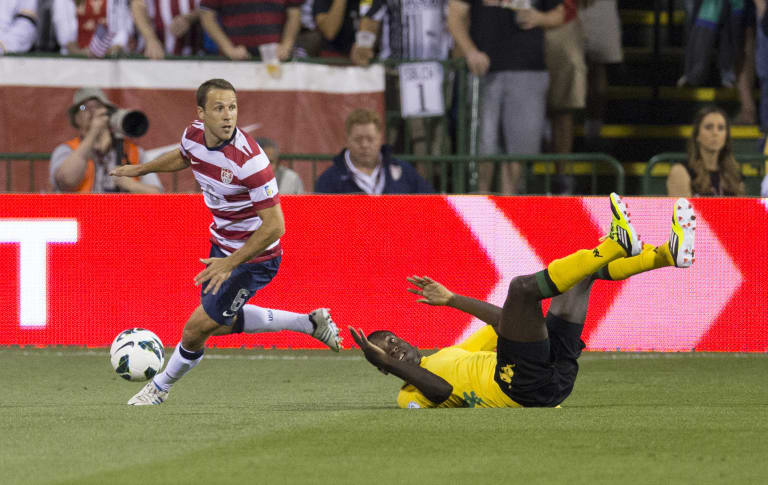
HEATH PEARCE
U.S. National Team: 2005-2012
Played 129 MLS games with FC Dallas, Chivas USA, New York Red Bulls and Montreal Impact
Played for FC Nordsjaelland and Hansa Rostock
MAX BRETOS: Steve Cherundolo is obviously a man who comes with tremendous credentials as a player and even as a coach in Germany. Just give me some feedback about what he was like as a player. What was the legacy of Steve Cherundolo and his time in Germany?
HEATH PEARCE: As a player it was consistency. He was known for top level professional. I think before most players had established a name for Americans, Steve Cherundolo was out there. He obviously left college very early to go and apply his trade in Germany. Spent his entire career at Hannover [96] from the moment he turned pro and is considered the ‘Mayor of Hannover’ for a number of reasons - not just because of the fact that he speaks better German than he does English at this point - but also because his quality as a player, as a leader, as a captain of the club is well known across the entire city as well as the entire country of Germany.
MB: What was he like as a competitor since you had the chance to play against him? What would you describe his playing style and what were his best attributes?
HP: Again, consistency was the thing that I always remembered about him. When I was a left fullback and when I came into the national team with him as a right fullback. He taught me a lot of tricks to the trade. We obviously went to the same university, played under the same coach at a college at different times. What I learned most is his willingness to teach. Obviously, it’s a highly competitive environment but for me he was constantly teaching me little tricks. Obviously, I was on the opposite side of the field but what to do in certain situations, how to get out of pressure, how to be smart about certain situations. And actually, when you are having an average day or a poor day to blend in and make yourself a role player instead of having to be a star or one of the standout players. There is a lot of these little things that you do not learn, and a lot of people don’t teach you. Steve Cherundolo taught me.
MB: What can you tell us about the experience that he had after his playing days in Germany that would prepare him to be a head coach? You know about German soccer firsthand – how will that experience prepare him for this next chapter with LAFC?
HP: Well obviously, the first thing I think about is just the professional atmosphere that Steve Cherundolo spent the last 20 plus years of his life in. From the moment that he embarked on his professional career. I believe he was still a teenager when he turned professional. Being in those professional environments where you are having to follow rules to become an adult at a very young age, to immerse yourself into the culture, a willingness to adapt to certain scenarios, environments, knowing that he’s gone on to learn German now, knowing that he went through a number of coaches throughout his career but continued to have that same level of success. I think all those things helped prepare him to become a manager. But more than anything it’s just his leadership. Again, his willingness to put the team first, his communication, the things that he learns, the way that he sees the game, his style of play, the time that he had for young players as well as veterans. There were so many things that I remember both playing with him as well as playing against him in the Bundesliga that I think prepared him for being a manager and a top-level manager at that.
MB: You mentioned young players and Steve has been very explicit about how he wants the help in the developing process of young LAFC players. Why do you think that he is going to be a success and he will be able to model to these young players what it means to become true professionals?
HP: Well, I think LAFC is at a point now where it’s time to establish where the club is going to go. The baton has been passed to this next stage, where at first they brought a lot of success to the club, a lot of attention to the club. And now you have to build a stronger foundation and Steve Cherundolo’s ability to develop the players that were relied upon heavily last season in the first team and prepare them for the MLS environment. I think speaks to his ability to develop players and put them in situations where they can transition quickly into the top level professional team. He also had to make ‘do’ with roster changes constantly, which I think helps to his advantage with the way Major League Soccer is structured with the rules the way they are and the way clubs have to be run. I also look at the fact that he was spending a number of his days at the training facility before heading off to match days in Las Vegas and immersing himself in the team, learning more about the club, immersing himself into the fan base and things like that. Taking that same approach as a player when was at Hannover to LAFC and the wider organization. I think all those things are going to help to make him a successful manager at the club.
MB: Germany is a country that recently has been on cutting edge of a lot of football ideas. You look at the managers that have come out and spoken on behalf of Steve Cherundolo, who worked with Steve - they are some of the biggest names in German football. How will having that German experience help him at LAFC?
HP: It’s funny actually, I spent a lot of time watching Steve outside of his coaching career as well as doing some of his broadcast work that he was doing with the Bundesliga, and seeing and hearing his opinion on the game - knowing what he thought about young players but also being realistic about young players. It shows he’s been in an environment where young players needed to be developed and pushed into the first team and developed and pushed through a club or environment. But also knowing that you have to manage other pieces of your club, veterans, other players, new transfers coming in, players that are going to come in and help immediately. Being able to balance all that I think is going to be really important. But being in the German system I think obviously they are innovators; they can also be very structured in terms of once they find an idea, building those ideas out, flushing those out. You go to all the German stereotypes from engineering on and they seem to be at the top tier of all those things - including the sporting side, especially after their revamp, which led them at the national team to be eventual World Cup Champions as well as having some of the clubs in the Bundesliga competing year-in and year-out for a Champions League Trophy. So that type of mentality, that type of expectation I think he spent the last 20 years of his life in it. It is going to help him be a successful manager as well as take some of things and on top of that keep some of those contacts close to him where he can continue to learn from others that he can apply to his managerial skills here in the United States.
MB: Recruiting players and making those relationships from Germany pay off - why will that be a strength? John Thorrington has said he talked to some of the players that are already with LAFC and they made a connection right away. How do you see that playing to Steve’s advantage?
HP: If you are a current player or you’re a new player coming through - the first thing you want to do is look at Steve’s credentials, right? And you see the kind of player he was with the national team and if you’ve talked to anybody who’s ever played with Steve Cherundolo at the national team or the club level, they’ll all speak consistently about the same things: What type of person he was, what type of teammate he was, what type of capabilities and ability he had as a player. Then you can see his leadership skills which tend to convert well into being a manager so when you’re a young player, you are going to connect with that. He’s very soft spoken but he is very clear with his words. I think communication is such an important aspect of being a good manager and Steve Cherundolo has always been able to communicate, even in our toughest times when I was playing with him in the national team – he knew how to deliver a message in very few words. When you are a coach, that is such an important part, that communication skill and he is so good at that. He obviously learned to do it in multiple languages and I think that willingness to be outside of his comfort zone and try new things and immerse himself into the situations that he puts himself into are only going to bode well as his success as a manager with LAFC.
